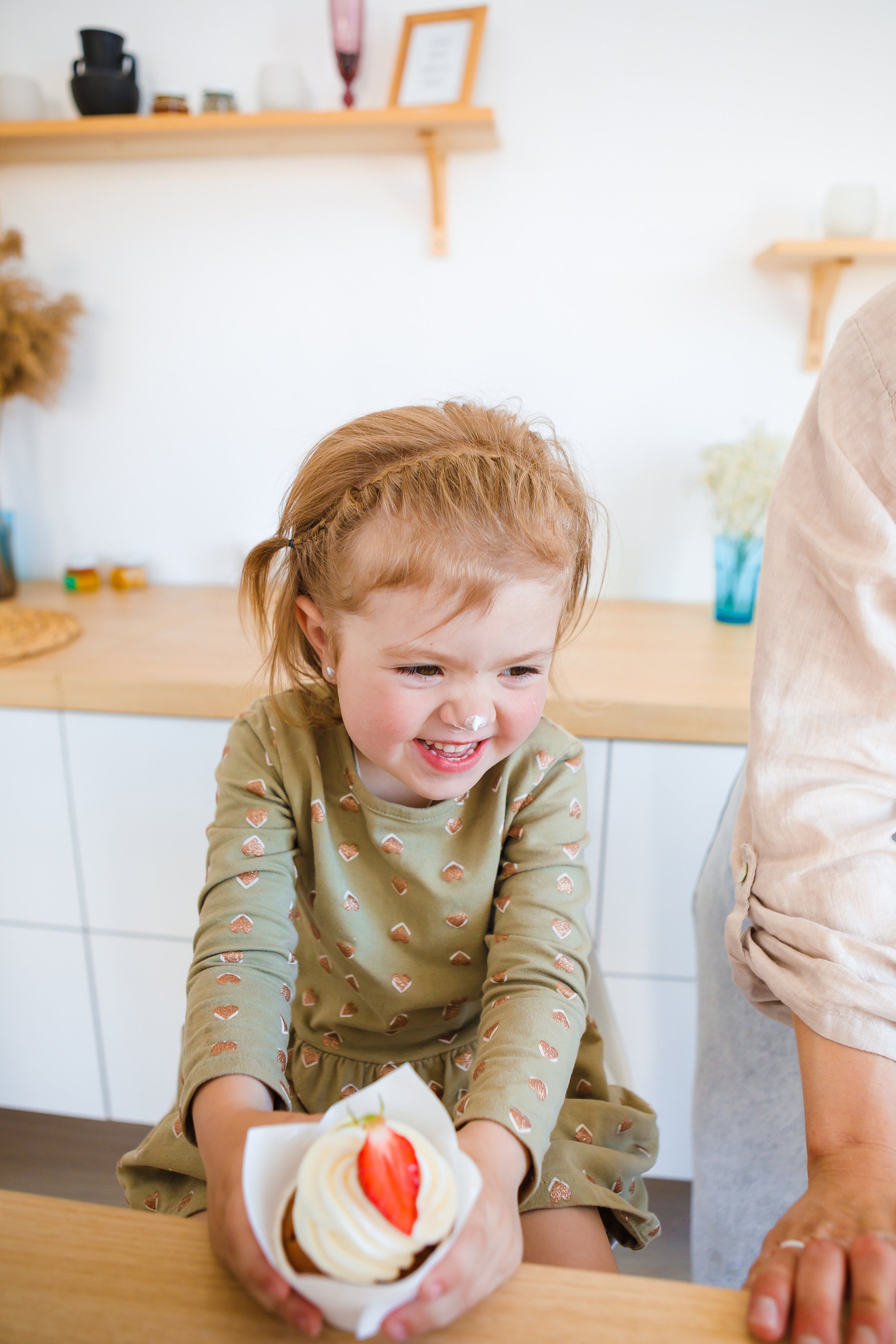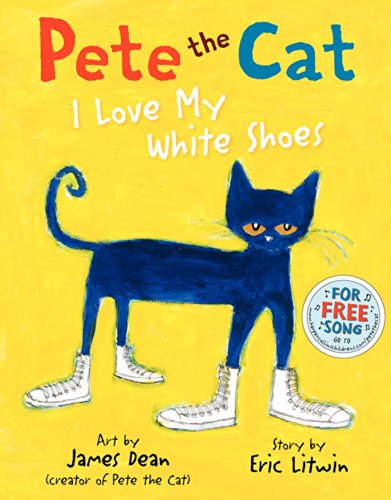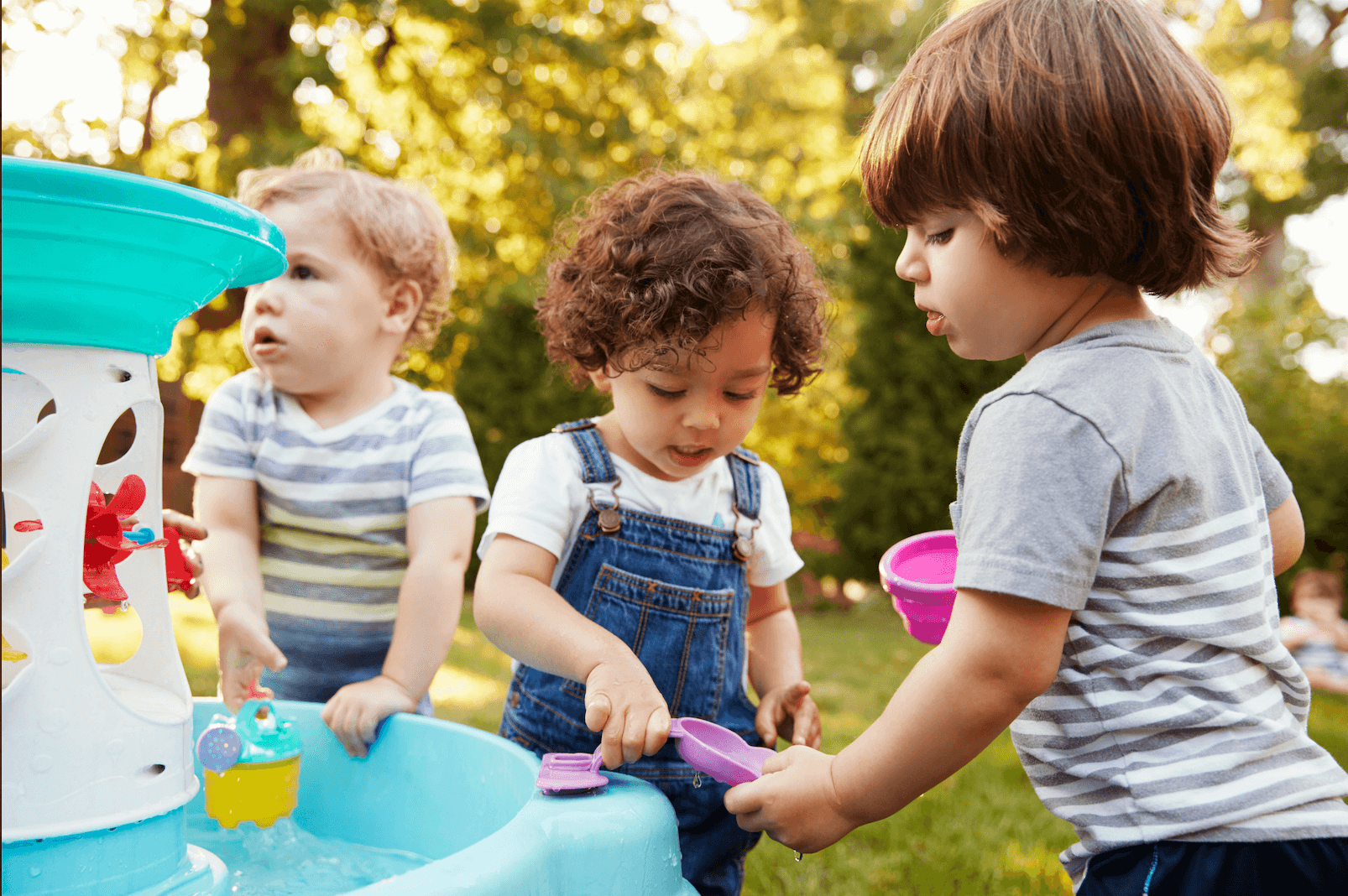Understanding Toddler Pronoun Mix-Ups
It's common for toddlers to mix up pronouns like "me" and "you" while learning to speak. These mistakes are a part of their language development. Pronouns are more abstract than other words like "ball" or "dancing" because their meaning changes based on who is talking and who/what is being referred to. Here are two examples:
The pronouns “you” and “me” change based on who is talking and who is listening.
The pronoun "she" could refer to Sarah, Jasmine, Bianca, or Jazz, depending on the context of the conversation.
Another common “mistake” is for toddlers to mix up “me” and “I.” So when your toddler says things like "me gonna do it," they are (likely) just using the wrong pronoun while they learn.
With time and practice, most toddlers learn to use pronouns correctly. And if you're looking to encourage your little one to learn new pronouns now, be sure to check out our speech therapy tips for teaching toddlers pronouns below. Remember, learning to use pronouns correctly takes time and practice, so be patient and have fun with it!
What is a pronoun?
Pronouns are words we use in the place of another noun (mostly people and things) to make our conversations simpler and more efficient. Instead of saying “the furry black dog” every time we mention it, we can simply say “it” to keep things flowing and avoid repetition.
There are many different pronouns we use in everyday conversations. Some common ones include: "he," "she," "it," "they," "we," "you," "him," "her," "us," "them," “I,” and "me."
When do toddlers learn pronouns?
Learning pronouns is an important part of a toddler's language development, but it's not usually the first thing they'll learn (except for "me"). It's important to remember that all toddlers learn at their own pace, and some may take longer to master pronouns than others. However, there are general guidelines you can use to track your child's progress and determine when to speak with your pediatrician for support.
Research on pronoun development is not extensive, and most of the available studies were conducted in the 1980s. Although this research is still used today, the milestones identified may not be entirely accurate. For instance, many 26-month-old toddlers may not yet use the pronoun "I" and instead say phrases like "Me want to go outside." If you would like to see the researcher's milestones, you can access them here (1).
-
12-26 Months: I, It (Subjective)
27-30 Months: My, Me, Mine, You
31-34 Months: Your, He, She, Yours, We
35-40 Months: They, Us, His, Hers, Them, Her
41-46 Months: It, Our, Him, Myself, Yourself, Ours, Their, Theirs
47+ Months: Herself, Himself, Itself, Ourselves, Yourselves, Themselves
As a pediatric speech therapist, I've developed a different way of looking at pronoun milestones based on my experience. Here are some rough guidelines for which pronouns toddlers typically learn at different ages:
1 year olds: Me, My, Mine, You, It, That
2 year olds: I, We, He, She, Your, Yours, This
3 year olds: They, Us, His, Hers, Them, Her, Him, Our, Myself, Yourself, Ours, Their, Theirs
4 year olds: Herself, Himself, Itself, Ourselves, Yourselves, Themselves
Remember, these are just rough guidelines, and it's always a good idea to speak with your pediatrician if you have any concerns or questions about your child's language development. And keep in mind missing one or a few pronouns probably isn’t a big deal, but something you can focus on at home using the tips for learning pronouns in this post. If you practice for a bit at home and your child is having a hard time learning pronouns, then it might be time to get a little extra support from a speech therapist.
Is pronoun reversal normal?
Yes, pronoun reversal is normal as toddlers are learning pronouns. Here are a few facts about toddler’s mixing up pronouns:
Pronoun confusion or reversal tends to decrease as toddlers imitate less and learn to say more sentences on their own (3).
Younger siblings may learn pronouns faster and mix up pronouns less often because they are hearing a greater variety of pronouns used in other people’s conversations (2).
Why do toddlers mix up pronouns?
Pronouns can be tricky for toddlers to learn because they are used flexibly and can refer to many different things or people depending on the context of the conversation. As a result, pronoun mix-ups are common. However, as toddlers start to create their own sentences and rely less on imitating what they hear, they tend to make fewer mistakes with pronouns.
It's important to remember that toddlers learn pronouns by hearing them in context. For example, if you say "Your turn," they may repeat it back to you because they want a turn and have learned that "your" refers to them in this situation. With continued exposure and practice with a variety of pronouns in different situations, toddlers will become more comfortable using pronouns correctly.
What to do if your toddler is mixing up pronouns?
You can encourage your child's pronoun development at home by emphasizing certain pronouns that are appropriate for their age. Start with these strategies for teaching pronouns and (ss always) consult your pediatrician if you have concerns.
Strategies for teaching pronouns:
1. Start with comprehension
Toddlers comprehend words, including pronouns, before they are able to use them. You can tell if your toddler is ready to start learning pronouns by testing their understanding of them. You can do this by sneakily asking questions during play or everyday activities. For example:
Let’s play with the red car. Can you find it?
Where is your coat?
Give it to her.
Get my cup please.
If they are able to successfully understand and follow these instructions, it's a good indication that they are ready to start learning to say pronouns.
2. Focus one pair of pronouns at a time
To make teaching pronouns easier, focus on one pair of pronouns at a time - for example - teaching you + me, he + she, your + my - instead of trying to teach all the pronouns at once. Toddlers learn best through repetition, so by concentrating on one pair, you can practice those pronouns more often, and your toddler is likely to learn them faster. Just make sure that the pronouns you choose to focus on are appropriate for your toddler's age.
3. Use gestures
Use gestures to help your toddler understand who or what you're referring to when you use pronouns. You may already be doing this without even realizing it. For instance, you can point to the object or person you're talking about. This helps to make pronouns less abstract and aids in your toddler's understanding of pronouns.
4. Say it from your toddler’s point of view
It can be useful to model pronouns from your toddler's perspective, as pronouns such as me/you will switch when you're talking versus when they're talking. To help them understand, you can say things like "My turn" and "Give it to me" while placing a hand on their chest to demonstrate that you're providing an example of what they could say.
5. Turn Taking Games
Playing turn-taking games is an effective way to practice pronouns with your toddlers. Simple games like blowing bubbles and hide and seek are great options. During the game, you can use pronouns such as "my turn" and "your turn" or "I found you" and "where are you?" to reinforce the concept of pronouns.
One mom on Instagram shared a creative game she plays with her toddler where they take turns "hiding" in front of the mirror and asking, "Who's that baby in the mirror?" and her little one replies, "It's me!" This game helps her toddler practice using pronouns. You can get as creative as you like and come up with your family's unique way to practice pronouns.
6. Books for learning pronouns
Books can be great tools for teaching toddlers to use pronouns correctly. These are my favorite books for practicing with pronouns:
This post contains affiliate links. As an Amazon Associate, Toddler Talk earns from qualifying purchases. Proceeds help support these resources.
A great book to start with! Your little one can practice “you” and “I” by asking and answering the repetitive questions in the book.
Make up your own shoe song and sing along with Pete the Cat. You can sing about your little one’s shoes “I love my blue shoes” and Mama’s shoes “I love your brown shoes.”
Once your toddler has a few pronouns under their belt, this can be a really fun book that focuses on many different pronouns.
The world of pronouns is changing! This is a great book for young children that talks about gender in a kid friendly way.
You can also adapt many other books to practice pronouns by reading them your own way. You can use repetitive phrases like “ I see a ____” or “He is _____” to comment on what you see on the pages, the repetitive nature of these activities can help toddlers learn.
When in doubt, visit a speech therapist!
Speech therapists are experienced at helping toddlers experiencing difficulties learning one or more parts of language. Here are a few reasons I recommend a speech evaluation:
A speech and language evaluation can help you find peace of mind or help you create the best plan for supporting your little one.
Speech evaluations are free in the United States through Early Intervention Programs (1-2 year olds)/ Public Schools (3 year olds & up)
Evaluation appointments often have a several week or several month wait time - so it’s best to start the clock now. You can always cancel an evaluation appointment if your concerns go away.
Helping toddlers as soon as you notice a difficulty is often easier than if you wait.
Here are some other questions parents ask about pronoun errors:
-
Pronoun reversal is very common. Almost every toddler will experience a period of pronoun reversal during their development.
-
Pronoun reversal is one of many characteristics of autism spectrum disorder. If your toddler is mixing up pronouns it doesn’t mean they have autism. If you practice with pronouns at home and you find your child isn’t meeting the milestones, you can talk to your pediatrician about your observation.
-
Because pronoun reversal is very common, I would consult with your pediatrician or speech therapist to discuss your observations and learn more about your child’s individual development and how you can support them.
-
As toddlers are learning new words, it’s very common for them to mix them up. However, for most toddlers they will mix-up words for a little bit - while they are learning - then they won’t mix them up any longer.
Written By: Stephanie Keffer Hatleli, MS CCC-SLP
© 2020-2025. Stephanie Keffer Hatleli, MS CCC-SLP. All Rights Reserved
More From The Blog:
References List:
Flahive, L. K., & Lanza, J. R. (2012). Guide to Communication Milestones.
Oshima‐Takane, Y., Goodz, E., & Derevensky, J. L. (1996). Birth order effects on early language development: Do secondborn children learn from overheard speech?. Child development, 67(2), 621-634.
Schiff-Myers, N. B. (1983). From pronoun reversals to correct pronoun usage: A case study of a normally developing child. Journal of Speech and Hearing Disorders, 48(4), 394-402.
Zane, E., Arunachalam, S., & Luyster, R. J. (2021). Caregiver-reported pronominal errors made by children with and without autism spectrum disorder. In Proceedings of the 45th Annual Boston University Conference on Language Development.© 2020-2023. Stephanie Keffer, MS CCC-SLP. All Rights Reserved.
The content offered on ToddlerTalk.com is for informational purposes only. Toddler Talk is not engaged in rendering professional advice, whether medical or otherwise, to individual users or their children or families. No content on this site, regardless of date, should ever be used as a substitute for direct medical advice from your doctor, speech language pathologist, or other health professional. By accessing the content on ToddlerTalk.com, you acknowledge and agree that you are accepting the responsibility for your child’s health and well-being. In return for providing you with information related to home speech and language practice, you waive any claims that you or your child may have as a result of utilizing the content on ToddlerTalk.com.














